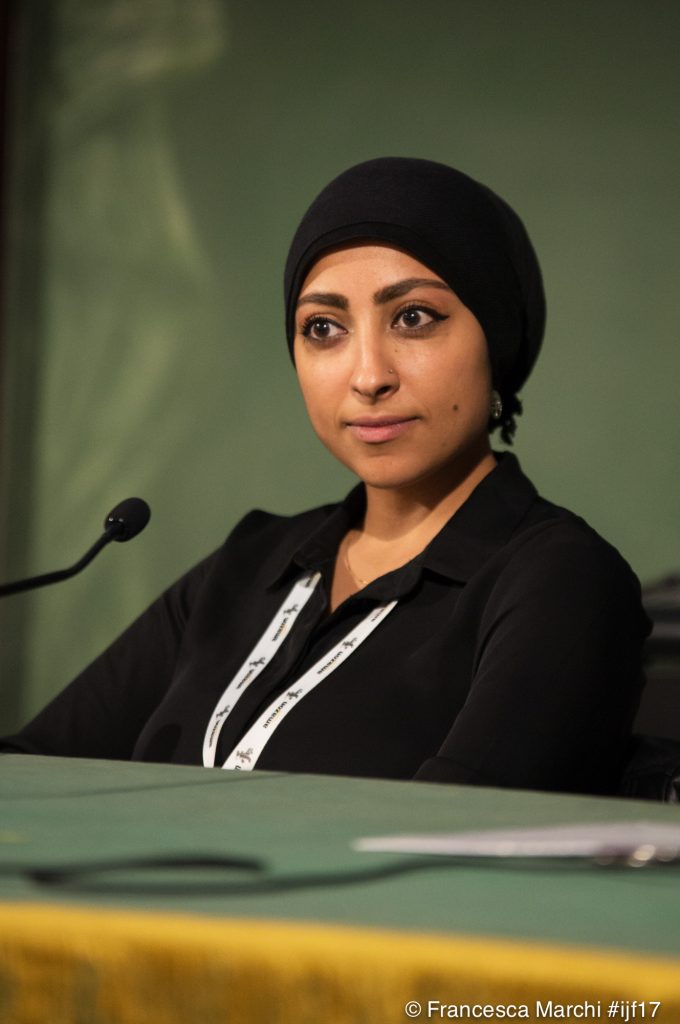
Three years ago, Maryam Al-Khawaja went to her home country, Bahrain, to visit her father Abdulhadi Al-Khawaja, a prominent human rights defender , who was protesting his life sentence with a hunger strike. Maryam was attacked, imprisoned for 19 days and then forced into exile. She was convincted, on false grounds, for “assaulting police officers.” Since then, she hasn’t been able to return to Bahrain, where she had a leading role in the 2011 democracy protests in Pearl Square. Despite this, she remains a leading activist in the struggle for human rights and freedom of expression worldwide.
“Freedom of expression has taken a very hard blow when it comes to the situation in the Middle East and North Africa,” said Al-Khawaja speaking at a session at the International Journalism Festival titled “Women on the front line in the fight for freedom of expression.” The discussion was moderated by Marina Petrillo, an author, broadcaster and journalist.
“But threats to our security do not stop at the border of the Middle East and North Africa,” she added. “Our governments are learning how to use our tools against us”. Smear campaigns are just one example of numerous tools that governments across the globe use against human rights defenders and journalists.
Al-Khawaja also highlighted the increasing crackdown on human rights activists’ privacy. “As a Danish citizen who was born in Syria, I can be stopped and asked for all the passwords from my social media,” Al-Khawaja explained, referring to the US entry regulations.
Travel bans are another widely used tool to stop human rights defenders and journalists from doing their work. Particularly in Egypt and in the Gulf countries, including Bahrain, travel bans have been imposed on many leading activists, impeding their ability to work internationally and to attend trainings and conferences, such as the International Journalism Festival.
“Not being able to travel, it makes my country feel like a prison,” said prominent journalist Khadija Ismayilova, who joined the panel via Skype from her home in Azerbaijan. Ismayilova is currently under a travel ban. In 2015, she was intimidated and blackmailed, arrested and convicted to seven years in jail for covering news about President Aliyev’s family and its corruption scandals.
“They go as far as our bedroom, as far as our private life,” said Ismayilova referring to the intimidation she experienced. Azerbaijan’s secret services placed some cameras in her bedroom and her private videos were shared online, following her bold reporting about President Aliyev and his family.
“The fact that we are women is being used against us,” she said. “Women can be arrested, some women activists have been tortured. … There is no gender difference in the risks we are facing,” said Ismayilova. Despite these risks, women are not giving up the fight for justice and truth.
“Khadija has been a mentor and a role model for many female reporters,” said Miranda Patrucic, a prominent journalist and a lead reporter and regional editor for the Organized Crime and Corruption Reporting Project (OCCRP). She reiterated what both Ismayilova and Al-Khawaja see as one of the most important objectives of human rights activists and journalists today – standing up against corrupt officials and oppressive governments. “Corrupt politicians and criminals, they are going global; and we have to be integrated to respond to the challenges they create,” said Ismayilova.
In her closing comments, Al-Khawaja emphasized the importance of challenging the discourse where women are seen as weaker, and recognizing instead that women have always played an equal, if not leading, role in activism.